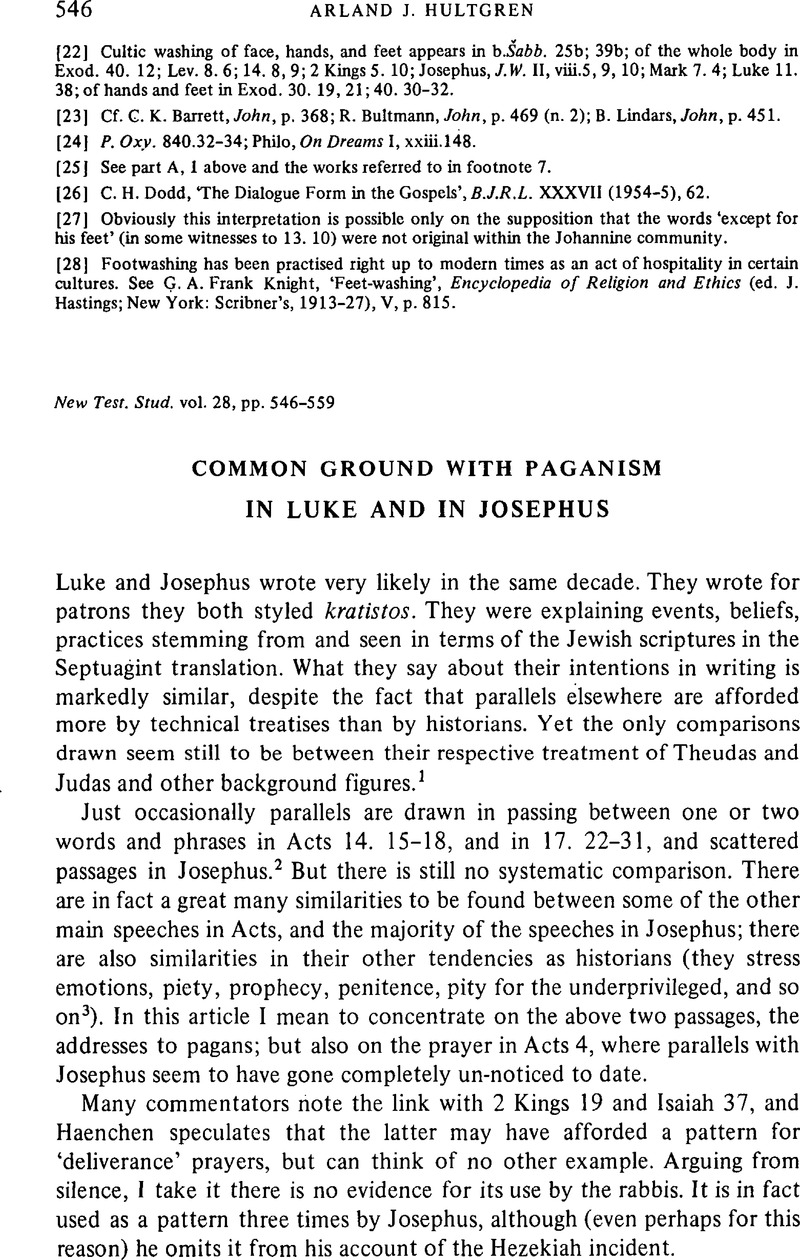Published online by Cambridge University Press: 05 February 2009

[1] E.g. by Barrett, C. K., in Luke the Historian in recent Study (Philadelphia, 1970), p. 9 in passing, p. 34 apropos of Acts 5. 36Google Scholar; illustrations from other contemporary writers seem to warrant much more space; in Marshall, I. H., Luke: Historian and Theologian, one reference in passing to Josephus' freedom in composing speeches (p. 55), one to Josephus on geography (p. 70).Google ScholarWilson, S. G., The Gentiles and the Gentile Mission (Cambridge, 1973), manages I think to ignore Josephus completely.CrossRefGoogle Scholar
[2] See below (nn. 4, 5, 10).
[3] See my ‘Redaction Criticism: Josephus' Antiquities and the Synoptic Gospels’, JSNT 9 (1980), 29–48, part IIGoogle Scholar; and my ‘Ethical Pagan Theism and the Speeches in Acts’, NTS 27 (1980), 544–63.Google Scholar
[4] Haenchen, E., The Acts of the Apostles (Oxford, 1971), pp. 225Google Scholar ff. Other commentators do not even pause to ponder (C. S. C. Williams, F. F. Bruce, Jackson and Lake). See Appended Note.
[5] O'Neill, J. C., The Theology of Acts (London, 1970), p. 145, referring to Eusebius, praep. ev. ix 18, 23, 27.Google Scholar
[6] O'Neill, op. cit., p. 150; Gärtner, B., The Areopagus Speech and Natural Revelation (Uppsala, 1955), passim.Google Scholar
[7] Hans, Conzelmann, ‘The Address of Paul on the Areopagus’, in Keck, L. E. and Martyn, J. L. (eds.), Studies in Luke-Acts, p. 219 and p. 224Google Scholar; cf. Haenchen op. cit., ad loc.
[8] Haenchen, op. cit., p. 529.
[9] Conzelmann, op. cit., pp. 226 f.
[10] Gärtner, op. cit., pp. 23, 29, 68, etc.
[11] Apion II 130, 262–8, 172; cf. J.W.I 425, II 358, Ant. IV 84, XIV 149 ff.; Apion I 21.
[12] Seen. 3 above.
[13] See, again, my ‘Ethical Pagan Theism’, NTS 27 (1980), 544–63 and n. 10, on entertainment in contemporary history-writing.Google Scholar
[14] Art. cit. Appended Note – I find another prayer very like those in Acts and in Josephus, in Philo, In Flaccum 120–125, containing all but the third item, though presenting a rather different order. The treatise is clearly intended for a non-Jewish readership: ‘O Lord (despota) …mighty king of mortals and immortals…’